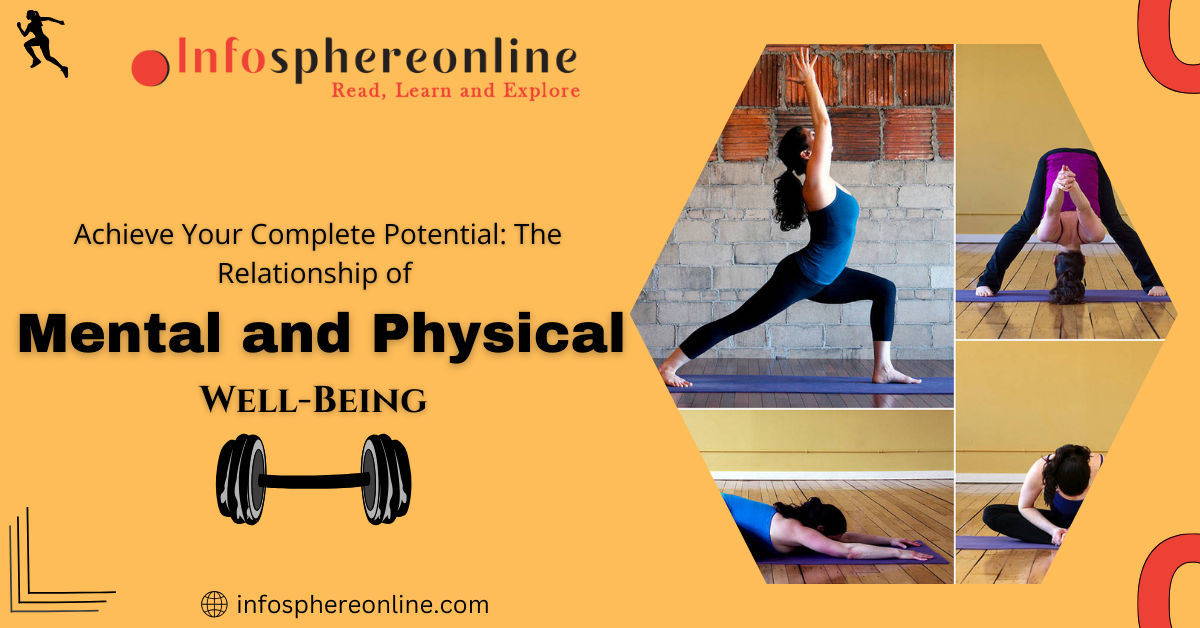Achieve Your Complete Potential: The Relationship of Mental and Physical Well-Being
- 46 Views
- Shweta Chauhan
- 16 October 2024
- Health and Fitness
The Strong Link Between Mental and Physical Well-Being
The relationship between mental and physical well-being is critical in today’s society. Frequent exercise has a dramatic effect on mental health. in addition to its physical benefits. Endorphins are “feel-good” hormones released after exercise that improve resilience and mood by lowering stress and anxiety. It can enhance sleep and lessen depressive symptoms, resulting in a beneficial cycle for the body and mind. There is no denying the link between mind and body: physical activity that strengthens the body also supports mental wellness. Exercise, whether it be walking or a gym period, changes your mental environment, making resources like infosphereonline invaluable for sharing tips and fostering a community around fitness.
How Frequent Exercise Improves Emotional and Mental Health
Frequent exercise positively impacts emotional and mental wellness. Exercise lowers cortisol levels, which are connected to stress, by helping the mind clear and concentrate on physical effort. Additionally, it raises neurotransmitters that lower anxiety and control mood, such as adrenaline and serotonin. The benefits of exercise go beyond fleeting happiness; by promoting well-being and self-worth, it creates long-term emotional stability. Resources like infosphereonline can provide valuable information and support for those looking to incorporate fitness into their daily routines. Regular exercise benefits the body as well as the mind, so take the first step toward improved mental health!
The Science Basis the Effects of Exercise on the Brain
The compelling effects of sport on the brain emphasize the significance of fitness in day-to-day living. Exercise improves brain function through better blood flow, which supplies the brain with oxygen and nutrients, according to neuroscience. This increases neurotrophic factors that are essential for neuroplasticity, such as Brain-Derived Neurotrophic Factor (BDNF). By releasing endorphins and lowering stress hormones like cortisol, exercise enhances mood and improves memory, focus, and memory.
Conclusion:
Achieving a balanced existence is essential in the modern world. Good mental and physical health are prerequisites for a balanced existence. Regular exercise releases mood-lifting endorphins to counteract stress and improves physical health, mental focus, and emotional resilience. In the meanwhile, mindfulness exercises that promote self-awareness and inner calm, such as journaling or meditation, enhance general well-being. When combined, they give you the confidence to take on obstacles. Make exercise and mental health care daily priorities to take charge of your health path. Beginning small will help you become healthy in the long run.
FAQ:
What benefits does regular exercise provide for mental health?
Frequent exercise enhances mental and physical well-being. Exercise improves emotional regulation and coping skills while lowering stress and anxiety through the production of endorphins. Additionally, it enhances the quality of sleep, which is vital for mental wellness and supports cognitive and emotional control. Even mild exercise improves mood and self-worth; find something you enjoy doing to turn exercise into a joyful lifestyle rather than a job. Making exercise a priority improves general happiness and mental toughness.
Is physical activity as beneficial for mental health as prescription drugs?
One effective strategy to deal with mental health is exercise. Studies indicate that regular exercising can successfully ease symptoms of anxiety and depression, even in addition to medicine.Exercises that provide a sense of success, such as walking, cycling, or yoga, improve physical health and strengthen mental resilience. Exercise also gives you structure for your day, may be enjoyable when done with others, and provides a healthy coping strategy for life’s obstacles.
What are the long-term advantages of integrating mental health practices with physical fitness?
Because these components complement one another, combining physical exercise with mental health techniques improves total well being. Frequent exercise produces endorphins, which improve mood and lessen stress. These benefits are enhanced by adding mindfulness or meditation, which encourages resilience and equilibrium. This all-encompassing method enhances focus, mental stability, physical health, sleep patterns, and lessens symptoms of despair and anxiety.
How does being physically fit help to lower anxiety and stress levels?
In the fast-paced world of today, anxiety and stress are frequent problems. Maintaining physical fitness is a potent therapy that enhances mental and physical well-being. Exercise increases endorphins, which are organic mood enhancers that cause an instantaneous decompression known as an “athlete’s high.” Additionally, it promotes serenity by lowering stress chemicals like cortisol and adrenaline.. Including mild activity, such as cycling or walking, in daily life greatly improves mental health by giving people the tools they need to naturally reduce stress and anxiety.
Recent Posts
- Travel Guide: Family, Culture, Eco-Tourism, and Luxury
- Backpacking Travel vs. Business Travel: Finding the Perfect Balance for Your Adventures
- Must-Try Outfit Ideas Inspired by the Latest Fashion Trends for Every Season
- Essential Parenting Resources for Managing Child Behavior and Overcoming Parenting Challenges
- Mastering Your Financial Goals: Essential Tips for Building an Emergency Fund and Planning for the Future

